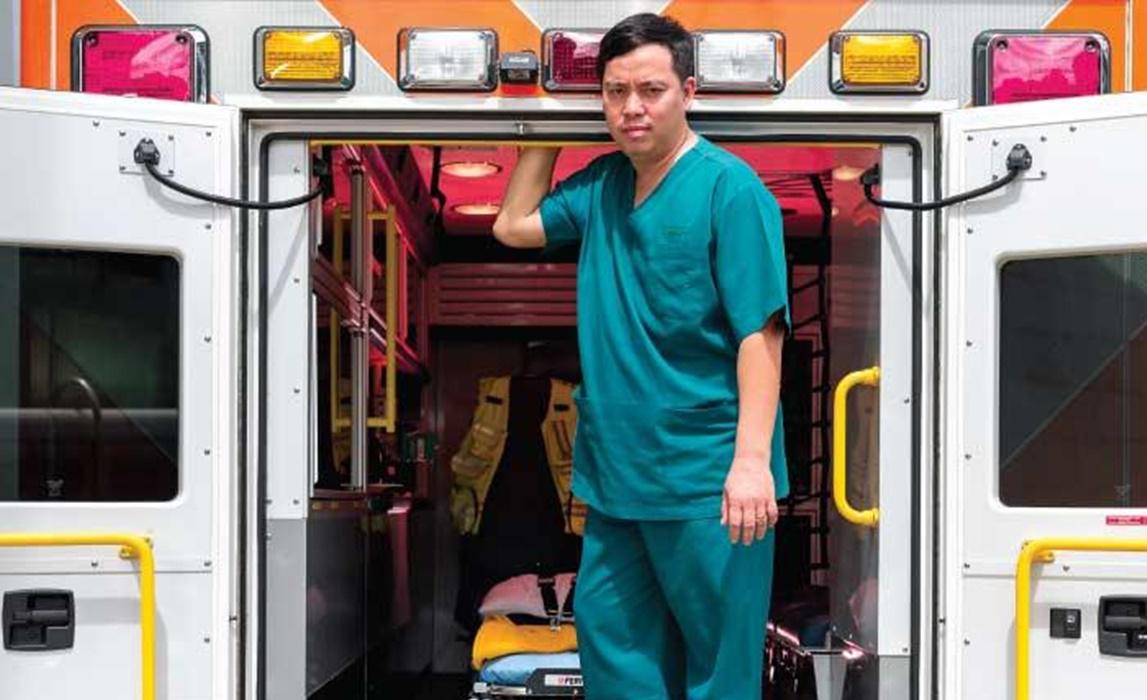N/A

Peter Cornish goes back and forth with an emergency doctor from Family Medical Practice Saigon. Photo by Vinh Dao.
Doctor Thinh has recently returned from America, where he undertook an extensive emergency medical response training programme designed for 911 first-responders. We caught up with him at Family Medical Practice, where he is one of the doctors accompanying ambulances on their emergency calls, to ask his opinion about Vietnam’s emergency services.
Tell us about FMP’s 24-hour emergency and evacuation service.
FMP has recently imported state-of-the-art ambulances, which are on standby 24 hours a day to respond to emergency situations. This is not a new service but one we’ve recently upgraded to bring in line with emergency services throughout the world.
As well as new ambulances, a critical difference in the service we now provide is the use of ProQA, which is the premier emergency response software used by 911 throughout America and in emergency centers in virtually every OECD nation, worldwide. With this system, we can now start giving medical advice to a patient or instruct a bystander in how to provide treatment within the first one or two minutes, a significant improvement.
When a call is placed to our team, the ProQA software helps our emergency crew to understand the situation and manage the patient’s emergency before an ambulance even arrives, if one is necessary.
When a *9999 call comes in, what are the procedures?
Previously, emergency victims had to wait for ambulances to arrive at the scene before they could be assessed by the doctor on board. In many cases, people opted to make their own way to their preferred medical facility in private transportation, such as by taxi. This process took time, and there was no immediate medical response available.
With our new system, the response can be immediate. Using the ProQA software, fully-trained emergency medical dispatch operators are able to provide prompt, life-saving medical advice following internationally-proven guidelines. From the second a call to *9999 is answered, the Q&A protocols kick into action, providing the fastest response to any given emergency.
Once an ambulance is dispatched and en route to the emergency, constant communication and updates are being transmitted to the ambulance crew so they can provide essential treatment once they arrive. After pick-up, the patient’s condition will be transmitted from the ambulance to the medical center in ‘real time’ via 3G from anywhere in Vietnam.
Who rides in the ambulance – a doctor, nurse or paramedic?
Vietnam is unlike many countries as doctors ride in ambulances, as well as a support nurse and driver. In most other countries, doctors are replaced by paramedics trained to deal with emergency situations.
What are their roles in the emergency response process?
Nurses in Vietnam are considered as assistants to the doctor and not decision makers. They are unable to provide extensive treatment, and that is why doctors ride with ambulances in Vietnam.
At present, Vietnamese law requires the presence of a doctor in ambulances to treat victims. This can be a problem – Vietnam has a shortage of doctors compared to some neighboring countries, with about 7.8 doctors per 10,000 people. Other countries have as many as 20 doctors for that population size.
What is the difference in roles and responsibilities between a doctor and a paramedic?
Paramedics are trained specifically to respond in emergency situations and are good in this environment. A doctor is trained to cover many aspects of medical treatment, but often lacks the specialized skills and experience needed for emergency first response.
Do paramedics exist in Vietnam?
No, Vietnam does not recognize the training and skills required for paramedics and does not include them as part of their medical service providers.
The well-being of patients at hospitals or clinics is potentially put at risk as a result of doctors being called away on emergencies. Appointments are frequently cancelled, which disrupts treatments and can create more work for support staff. If ambulances were staffed by paramedics, it would speed up processes and create greater efficiency and patient care.
In addition to the use of ProQA, what can be done to improve emergency response units in Vietnam?
I would like to see Vietnam recognize the value of paramedics in emergency situations and establish a training school to meet the current need. In the meantime, paramedics recruited from outside Vietnam would have an immediate and obvious impact on the country’s population. The first barrier we face is a job description for paramedics, as the Ministry of Health does not currently recognize the role. We need changes in the law to recognize that doctors are not needed in ambulances and that well-trained paramedics are more than sufficient. This will save the health system considerable money as well as providing a more efficient service.
Is there anything you would like to add?
People sometimes complain about the number of questions asked by our Emergency Medical Dispatchers. I would like people to understand that every piece of information provided is recorded into the ProQA system to help the calltaker and ambulance crew to manage the emergency, prepare the correct equipment, and be ready before reaching the scene of the emergency. This is essential to the well-being of the victim. If you call, be calm, answer the questions, and if you don’t know the correct answer to a question, just say that you don’t know.
I should also encourage people to subscribe to the service if they want for themselves and their family members to be protected for ambulance and emergency response under the ProQA system. The number for registration is 093 277 6971, and the fee is VND575,000/person/year. It’s very important if you want to have access to that immediate medical response if something happens without warning.
For more information about *9999, see www.star9999.vn.
Dr. Bui Nghia Thinh - Emergency Medical Director ∗9999, Family Medical Practice Ho Chi Minh City
 본 웹사이트는 사용자 경험을 향상을 위해 쿠키를 사용하고 있습니다.
본 웹사이트는 사용자 경험을 향상을 위해 쿠키를 사용하고 있습니다.